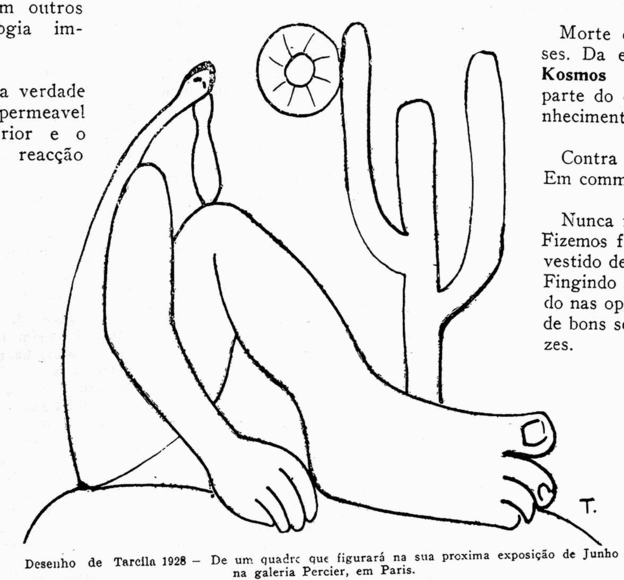Anthropophagy & you

Dear Readers, by a happy coincidence, today (January 11) is the inaugural post of Brazilian poetry and poetics, and the birthday of Oswald de Andrade, one of the founding poets of Brazilian modernism. "Tupi, or not Tupi that is the question," Oswald famously asked (in English) in the Manifesto Antropófago (Cannibal Manifesto, 1928), which adopted cannibalism (and the figure of the indigenous Brazilian cannibal) as a metaphor for a new Brazilian art that would devour and assimiliate European culture and the European vanguards along with local nature and culture to produce a native national art free of its colonial past. Oswald's writing has touched every Brazilian poetic vanguard since.
It is nearly legendary that Tarsila do Amaral's painting "Abaporu" (1928)--her birthday gift to Oswald--inspired the Anthropophagy movement. ("Abaporu" is Tupi-Guarani for "cannibal.") Tarsila's drawing based on "Abaporu" illustrates the Manifesto Antropófago, which appeared in the first "dentition" of the modernist magazine, Revista de Antropofogia (above). Today, I invoke Tarsiwald (as fellow modernist Mário de Andrade called the couple) to welcome you to Brazilian poetry and poetics.
I hope you will join me here often for tastes of current Brazilian poetry, in as experiential a way as can be achieved on this platform. I'll draw topics from my home base in Rio and from the wider world of Brazilian poetry, and I'll complement these Commentaries with artwork by contemporary Brazilian poets making visual art. I will try to translate when necessary from Portuguese into English, and explore some issues in translation while I'm at it, but in anthropophagist spirit, I encourage you to take in what you find here regardless of language, and make from it your own thoughts and responses. I hope we'll begin a rich conversation. Please be in touch with your feedback and questions about Brazilian poetry via Jacket2 Editor Jessica Lowenthal. Thank you to everyone who has already written in anticipation of these Commentaries.
I leave you with something of Oswald himself, his voice, reading from the "Cântico dos Cânticos para Flauta e Violão" (Song of Songs for Flute and Guitar, 1942). In this love poem to his later wife Maria Antonieta d'Alkmin, you'll hear the repetition of her name and the comforting tick of the clock ("relógio"): As coisas são / As coisas vêm / As coisas vão / As coisas / Vão e vêm / Não em vão / As horas / Vão e vêm / Não em vão. (Things are / Things come / Things go / Things / Come and go / Not in vain / The hours / Come and go / Not in vain.) For more recordings of Oswald and others reading his work, Augusto de Campos and Cid Campos produced the marvelous CD Ouvindo Oswald.
As Angélica Freitas invites in Rilke Shake (2007), "Dig in."
Brazilian poetry and poetics